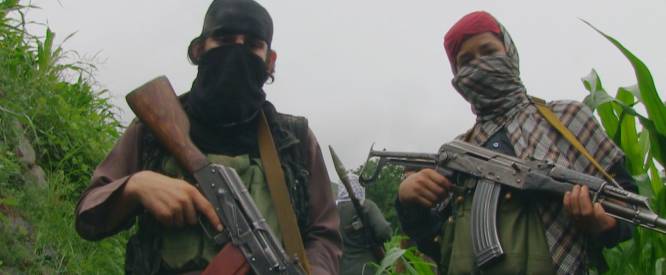 WATCH: A Conversation With Teens in Training as ISIS Suicide BombersNovember 16, 2015, 2:34 pm ET Few journalists have reported safely from inside ISIS-held territory in Eastern Afghanistan, where the terror group that has claimed responsibility for last Friday’s attacks in Paris has been gaining ground over the past year. But after eight months of trying, FRONTLINE’s Najibullah Quraishi made his way in this past summer, capturing what he saw on film. The resulting documentary, ISIS in Afghanistan, premieres tomorrow night on FRONTLINE. It’s a rare, firsthand look how the self-proclaimed Islamic State is expanding its grip in the country, fighting some members of the Taliban and co-opting others, all while stepping up attacks against Afghan forces. It’s also a record of one particularly disturbing way the group is trying to expand its influence: training children and teenagers to become the next generation of jihadis. In the below excerpt from ISIS in Afghanistan, Quraishi journeys into Chapa Dara district — a region once home to Taliban and Al Qaeda fighters loyal to Osama bin Laden, and that is now home to militants claiming allegiance to ISIS. The commander there, “Mawlawi,” invites Quraishi to meet two teenagers — Bashrullah, 13, and Naimatullah, 17 — who are being groomed to become suicide bombers. They tell Quraishi that they’ve tried on suicide vests, and he asks them if they’ve learned how to detonate them. “Yes, I have practiced that — my commanders showed me how,” Naimatullah says. The boys go on to tell Quraishi that their trainers are foreigners, but they do not elaborate. They say they’re ready to carry out their suicide mission whenever the order comes. “Do you even know how to drive?” Quraishi asks, getting a yes. Then, he asks the boys whether they’ve ever been to school. “No,” he’s told. “We are here in Afghanistan, we see all the fighters, we learn from them … We want to be like them.” ISIS in Afghanistan is the latest FRONTLINE documentary from Quraishi, an Afghan journalist who has covered the war between the Taliban and the American-led coalition for more than a decade. His previous films include The Dancing Boys of Afghanistan, which exposed the revival of a practice known as “bacha bazi,” where young boys are sold by their families to “entertain” wealthy merchants and warlords, and Opium Brides, which explored the collateral damage of the country’s counter-narcotics effort. But Quraishi found what he saw while making this documentary — from the teenagers above, to even younger children being taught “jihad lessons” — particularly sad. “When I saw these young children, I was really, really upset,” he says at one point in the film. “I was thinking about … Afghanistan’s next generation; what we have next,” he says. “These children who learn how to kill people, how to do jihad, how to behead, how to fire?” ISIS in Afghanistan premieres Tues., Nov. 17 at 10 p.m. EST/9 p.m. CST on PBS stations (check local listings) and online at pbs.org/frontline. FRONTLINE’s Nov. 17 episode will also include a second segment about a Pakistani police unit’s fight against the Taliban. RELATED
|
SUPPORT PROVIDED BY
|
FRONTLINE Watch FRONTLINE
About FRONTLINE
Contact FRONTLINE
Privacy Policy
Journalistic Guidelines
PBS Privacy Policy
PBS Terms of Use
Corporate Sponsorship
FRONTLINE is a registered trademark of WGBH Educational Foundation.
Web Site Copyright ©1995-2016 WGBH Educational Foundation
PBS is a 501(c)(3) not-for-profit organization.







In order to foster a civil and literate discussion that respects all participants, FRONTLINE has the following guidelines for commentary. By submitting comments here, you are consenting to these rules:
Readers' comments that include profanity, obscenity, personal attacks, harassment, or are defamatory, sexist, racist, violate a third party's right to privacy, or are otherwise inappropriate, will be removed. Entries that are unsigned or are "signed" by someone other than the actual author will be removed. We reserve the right to not post comments that are more than 400 words. We will take steps to block users who repeatedly violate our commenting rules, terms of use, or privacy policies. You are fully responsible for your comments.